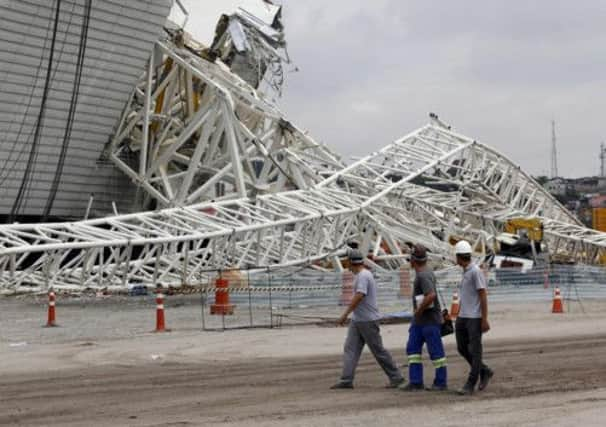Work resumes at scene of World Cup stadium tragedy


Small groups of stonemasons, metal workers and others trickled into the Itaquerao Stadium in Sao Paulo, expressing determination to finish work ahead of the World Cup opener on 12 June. “We are all Brazilians and Brazilians never quit. We’re going to get our work done and the first game of the World Cup will be held here,” said 26-year-old metalworker Americo Barbosa.
Construction company Odebrecht suspended work on the site after a crane collapsed last Wednesday as it was hoisting a 500-ton piece of roofing, killing two workers. The cause of the accident was not yet known, but investigators said they were considering human error, a problem with the crane and the possibility that rain-sodden ground had shifted under the weight.
Advertisement
Hide AdAdvertisement
Hide AdWhile the area where the accident occurred remained off-limits, authorities gave the green light for the site’s 1,350 workers to resume work on most of the stadium. However, the Labor Ministry has frozen use of the site’s nine other cranes until Odebrecht shows adequate safety measures are in place. Ahead of the resumption of work, more than 100 workers gathered early Monday for a prayer honoring the two victims.
Brazil’s preparations for the World Cup and the 2016 Olympics have been plagued by delays, cost overruns and constant pressure to move faster. Officials from world football’s governing body, Fifa, has publically scolded Brazilian officials over the problems, and a series of spats have flared up between the two sides.
Six of 12 World Cup stadiums were delivered for the Confederations Cup, a World Cup run-through, earlier this year, and Fifa is pressing for the six others to be delivered by the end of December.
Although Wednesday’s accident did minimal damage to the Itaquerao, which officials had said was 94 per cent finished before the accident, it’s assumed the stadium will not meet that deadline. Resumption of work on the stadium, which is also known as Arena Corinthians, came as Fifa officials began to gather in the coastal Brazilian state of Bahia ahead of Friday’s World Cup draw.
Meanwhile, Brazil has decided against opening more routes for foreign air carriers for next year’s World Cup, certain it can handle the millions of sports fans who will use planes to get around South America’s biggest country.
Civil Aviation Secretary Wellington Moreira Franco said the idea of expanding routes for foreign carriers “was never considered,” adding that Brazilian carriers can handle the load with 600,000 foreigners and more than three million Brazilians expected to head to matches.
The country has limited rail service, the road network is underdeveloped and overtaxed, and flying will be the only alternative for most traveling to the 12 host cities. Brazil is just a little smaller than the United States or China, and it can take ten hours to fly the 2,000 miles from the Amazon city of Manaus in the northwest to Porto Alegre in the southeast – depending on the connections.
Moreira Franco said plans should be announced in the next few days, perhaps pegged to the outcome of Friday’s draw, when teams will be placed by lot into eight four-team groups. “We will improve and increase the aerial grid to offer more flights,” he said. “With that, not only will we take care of the demand, but it will cause a decrease in prices (of tickets).”
Advertisement
Hide AdAdvertisement
Hide AdMany of Brazil’s airports are outdated, particularly in Rio de Janeiro and Sao Paulo. Airports in both cities are getting minor facelifts, but major improvements won’t be ready until after the World Cup.
Moreira Franco acknowledged there will be few upgrades for the World Cup, but said things would be ready for the 2016 Rio de Janeiro Olympics.